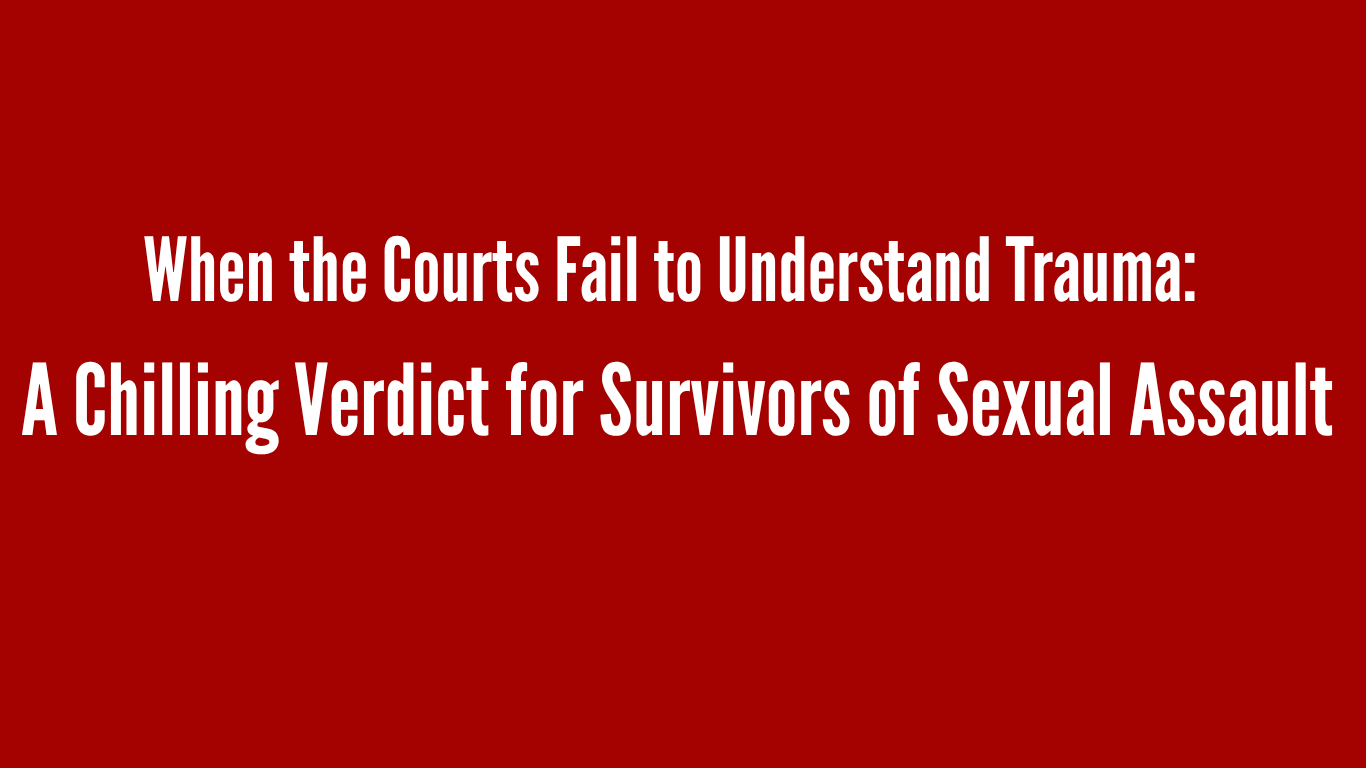In the wake of a recent high-profile trial that resulted in the acquittal of five men accused of gang sexual assault, Julie Lalonde—a respected advocate, educator, and author—spoke plainly about what many survivors and feminist advocates have long known: the legal system in Canada continues to fail survivors of sexual violence. Her televised interview offers not only a searing critique of the ruling but also a broader call to action for justice that recognizes the realities of trauma.
“Unfortunately, as someone who’s been doing this work in Canada for over 20 years, I was not surprised that all five of the men were acquitted,” Lalonde begins.
She goes on to express disappointment not just in the outcome, but in the way the verdict was delivered. The judge took more than five hours to read her ruling, which Lalonde describes as “really smearing of the complainant.” The complainant—known publicly as EM—was dismissed as neither credible nor reliable. But as Lalonde points out, this dismissal was grounded in a fundamental misunderstanding of how trauma affects memory and perception.
When the Legal System Ignores the Science of Trauma
During a traumatic event, memory does not function like a recording device. Fear and panic can overwhelm the brain, causing a fragmented recall of events. Survivors may remember certain details vividly while struggling to recount timelines or peripheral facts. This is not a sign of dishonesty; it is how the brain survives trauma.
“It really seems to us that this is a justice that does not understand how fear can manifest itself and how trauma can impact memory,” Lalonde says.
This gap in understanding—between what trauma experts know and what judges apply in their rulings—continues to result in survivors being discredited in court. It also highlights how judicial training, even after initiatives like Rona Ambrose’s push for better education on sexual assault, remains deeply insufficient.
Disbelief as Institutional Violence
For many survivors, the legal process is itself a source of harm. EM, through her lawyer, released a statement expressing that she had “never experienced not being believed like this before.” Her experience reflects what countless survivors in Canada already know too well: reporting sexual violence can result in not only disbelief but public scrutiny, character assassination, and retraumatization.
“When your trauma is not acknowledged, you kind of get stuck in that memory,” Lalonde explains. “You get stuck in that space, and it’s harder for you to move through it and move past it.”
And when a ruling actively discredits a survivor’s account without a trauma-informed lens, it compounds the original harm—this time with the authority and weight of the courts behind it.
A System Designed to Fail
This case is not an outlier. Lalonde connects it to a wider pattern seen in cases like Jian Ghomeshi’s and Harvey Weinstein’s. Across jurisdictions and countries, sexual assault trials are often reduced to credibility contests shaped by unrealistic expectations of how a survivor should behave or recall details.
“If you were to experience a car accident and then have to go and recreate, beat for beat, what happened chances are you wouldn’t be able to, because you were in shock,” Lalonde notes. “That is a well-researched, well understood phenomenon in psychology, but it seems to be completely absent from legal analysis.”
When courts disregard this evidence, they uphold a version of justice that is fundamentally hostile to the lived experience of survivors.
The Chilling Effect
Perhaps the most disturbing consequence of this verdict, Lalonde argues, is the ripple effect it will have across the country. In the days following the trial, sexual assault centers reported a spike in calls—many from people who had planned to report but now felt that doing so would be futile.
“We’re going to see a really profound chill effect of people just throwing their hands up and saying, there’s no point in me ever reporting this,” she warns.
This isn’t just a tragedy for survivors—it’s a public safety crisis. When survivors stop reporting, perpetrators remain unaccountable, and communities remain unsafe.
“We should all be concerned about that chill effect,” Lalonde says in closing.
Where Do We Go From Here?
This trial and its outcome raise critical questions: What kind of justice system do we want? One that silences, discredits, and retraumatizes survivors? Or one that listens, understands, and responds based on evidence—not myths, not stereotypes, and not outdated assumptions about how people “should” behave in the face of violence?
Until the legal system is reformed to incorporate a trauma and violence-informed, survivor-centred approach, we will continue to see verdicts like this one—and continue to lose the trust of those who need justice the most.





I absolutely agree with this BUT why is defense counsel never mentioned? Crown prosecutors are usually their trying to WIN the case for survivors. I am not in anyway saying they are perfect or this article is not correct. I agree with all of it. But DEFENSE counsel who’s whole job it is to discredit the victim is never brought up. Defense it their to protect those who are accused of the abuse.
Also in family court as well, this is desperately needed as well.
Great article!